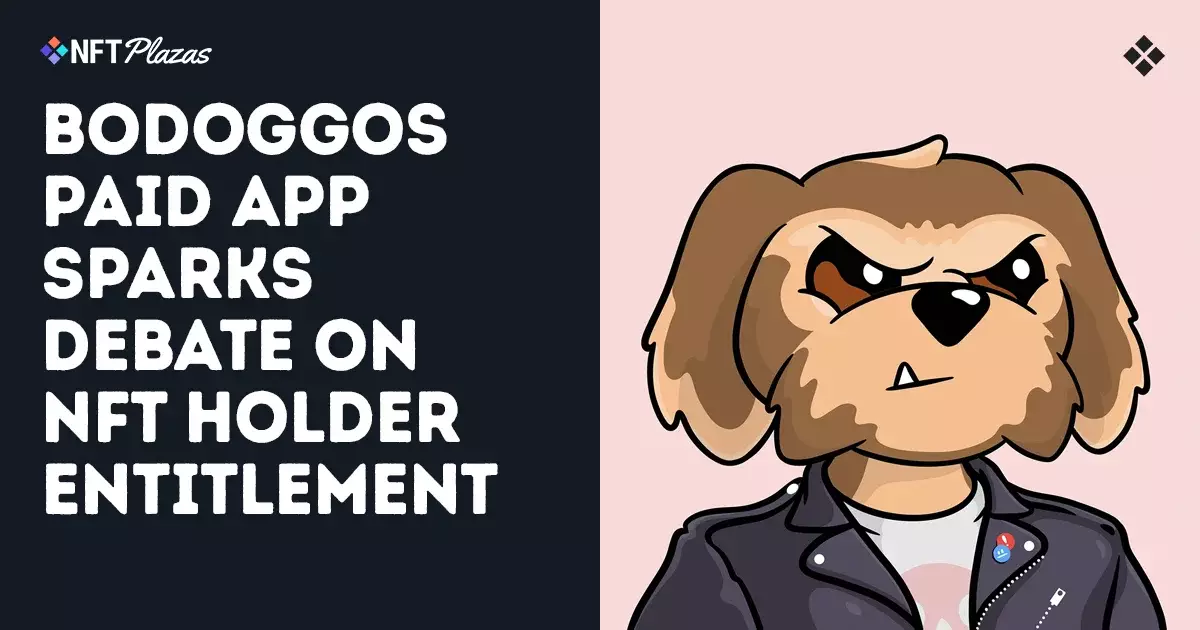The recent controversy surrounding BoDoggos and its decision to charge NFT holders for access to a trading news app has ignited a fiery debate within the expansive NFT community. The incident erupted when a disgruntled backer, known as @Lewsiphur, publicly criticized this monetization strategy, claiming that NFT ownership should inherently offer perks such as app access for free. While it’s easy to sympathize with the sentiment of entitlement within the community, this dispute unveils crucial complexities about the sustainability of NFT projects and the real expectations of collectors versus creators.
Many in the NFT realm see themselves as patron saints of digital art, viewing their investments as both emotional and monetary. However, this perspective often skews the reality of what any NFT project requires to succeed. The BoDoggos team justified their subscription model by pointing out the real financial needs behind project management—ongoing costs that include API fees, salaries, and operational expenses. Thus, while the community is vocally against what they perceive as exploitation, the team is simply navigating the harsh economic reality of running a start-up in a highly speculative space.
The Fallacy of Lifetime Entitlement
What we are witnessing in this ongoing discourse is a blatant illustration of a growing fallacy in the NFT community: the notion that a one-time purchase confers lifelong benefits. Leon Abboud, founder of Unfungible, articulated the problem accurately by stating this attitude is “preventing the space from growing and evolving.” This is not a callous corporate stance—it’s a desperate plea for the sector to understand that sustainable revenue is pivotal for survival in a fast-paced ecosystem often defined more by volatility than stability.
If NFT holders’ primary concerns hinge on free access to participatory benefits, we risk cultivating a generation of entitled investors who fail to recognize or support the intricacies that minting, marketing, and maintaining these digital assets entail. The argument isn’t just about one app—it’s about the future viability of NFT projects as a whole.
Web3 is Still a Business
Critics like @mattmedved emphasize that Web3 businesses are, at their core, still businesses—it is a reality too many players conveniently overlook. Entrepreneurs and innovators are motivated by the desire to push boundaries, but they also bear significant risks and responsibilities. There’s an inherent tension in balancing community expectations while ensuring that the bottom line is not only healthy but also capable of scaling up and innovating further. Revenue isn’t a villain; it’s a necessary ingredient for sustaining any project one’s passionate about.
This brings us to an unsettling revelation: many expect that the same fervor that sparked the NFT craze should suffice to sustain it. This is naive and oblivious, especially when the economics of running a vibrant digital ecosystem require controlled input costs, funding for ongoing development, and the occasional glimmer of profit to keep the lights on.
The Price of Staying Relevant
The BoDoggos controversy does more than just highlight economic tensions; it underscores a broader issue of relevance. A day after the initial fallout, member @Chilearmy123 went on the offensive, questioning the rationale behind another project, Chonks, which had failed to establish a lasting presence. The ensuing backlash illustrates a captivating dynamic in the NFT space: projects are judged not only by their success but also by other projects’ perceived failures.
Critics of this framework suggest that placing value judgments on a product’s market performance ultimately creates an atmosphere of skepticism and paranoia. The expectation of constant growth or at least stasis creates an unsustainable bias towards short-term trends, often has disastrous implications for artistic integrity and project innovation.
In a space as eclectic and vibrant as NFTs, the defining elements of sustainability require innovation, transparency, and above all, a collective understanding that value is not always linear nor guaranteed. Embracing this notion could allow the community to partake in a more realistic discussion about expectations and engagement without devolving into hostile or detrimental rhetoric. If NFT enthusiasts genuinely want to see their investments flourish, modifying their expectations might just be the first step toward creating a more resilient and vibrant ecosystem.


Leave a Reply